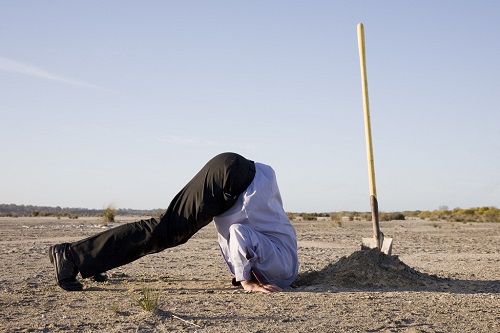1. Abbott’s energy white paper focuses on fossil fuel favourites
We should take a longer look at the Abbott government’s energy white paper, but from what Giles Parkinson says it would be a waste of time. As expected it ignores climate change and sees our future based on fossil fuels. Here’s Tones peering into our energy future:

The world will pass him by!
2. Solar news
RenewEconomy was a flood of articles about solar.
A company based in the world’s largest oil exporting nation, Saudi Arabia, has become the new owner of Australia’s second-largest solar plant – the under-construction 72MW Moree PV project – after buying Spanish solar developer Fotowatio Renewable Ventures (FRV) and its 3.8GW global development pipeline.
Abdul Latif Jameel Energy and Environmental Services – a conglomerate that also has a base in the United Arab Emirates – announced its purchase of FRV on Wednesday, describing it as a major development of its energy business, and part of its on-going strategy to be the Gulf’s largest solar power plant developer.
Giles Parkinson says the prospects for big solar in WA are bright.
James Mandel and Leia Guccione take a look at a Rocky Mountain Institute report that analyzes how grid-connected solar-plus-battery systems will become cost competitive with traditional retail electric service and why it matters to financiers, regulators, utilities, and other electricity system stakeholders.
Paul McArdle reports on the benefits of tracking systems in solar PV from a seminar hosted by the UQ Energy Initiative and the Global Change Institute.
And more, as the Abbottistas fade into irrelevance, except that they are presently running (ruining?) the country.
3. Aluminium battery charges in one minute
US scientists say they have invented a cheap, long-lasting and flexible battery made of aluminium for use in smartphones that can be charged in as little as one minute.
The researchers, who detailed their discovery in the journal Nature, said the new aluminium-ion battery had the potential to replace lithium-ion batteries, used in millions of laptops and mobile phones.
Besides recharging much faster, the new aluminium battery is safer than existing lithium-ion batteries, which occasionally burst into flames, they added.
While lithium-ion batteries last about 1,000 cycles, the new aluminium battery was able to continue after more than 7,500 cycles without loss of capacity. It also can be bent or folded.
Larger aluminium batteries could also be used to store renewable energy on the electrical grid, Professor Dai said.
Meanwhile the US market for energy storage management systems, that is the software suites designed to increase the operating efficiency and overall value of energy storage, will grow tenfold between 2014 and 2019.
5. French banks rule out funding Galilee basin coal project
France’s three biggest banks have ruled out funding the controversial multi-billion dollar Galilee basin coal mining, rail and port development in Queensland. Eleven major international lenders have now publically stated that they won’t finance the $16.5 billion dollar project and one analyst says more delays could see the Indian company behind the project ultimately scrap the development.
6. Rising sea levels to force the largest exodus in history
Scientists calculate that within the next three decades a substantial area along the Bay of Bengal, a region of delta approximately 200 delta islands in India and Bangladesh called the Sundarbans, will be underwater due to climate change and rising sea levels. If that happens, the millions of people living there now will be forced to abandon their homes and lands, making their displacement the largest exodus in modern history.
Estimates predict that the region will be underwater within the next 10-25 years, forcing 8 million Bangladeshis and 5 million Indians inland.
That makes 13 million displaced. Other large movements cited include 10 million during the 1947 India-Pakistan partition and 7 million African Americans move from the southern states northward during the period 1916-1970. The one he missed was the movement of Germans from Eastern Europe towards the end and after World War II. Tony Judt reckons 13 million.
7. Contrarian climate scientists
Dana Nuccitelli reviews an interview with top contrarian climate scientists Roy Spencer and John Christy. You can read his analysis of their flawed thinking and erratic statements. I’d like to pull out three points.
First, John Cook et al’s survey that established the 97% consensus in the peer-reviewed literature on human-caused global warming does not categorise the 3% as complete denialists. The 3% includes papers by scientists, such as Spencer and Christy, who minimise human influence on global warming. Complete denialists amongst climate scientists are rare if they exist at all.
Second, the American Meteorological Society (AMS) and Yale University conducted a survey of meteorologists in relation to climate science and global warming. Only 13 percent of survey participants described climate as their field of expertise. I was surprised at how low the number is.
Third, on the cost of renewables:
Experts in these fields who have published research on the subject have found that fossil fuels are incredibly expensive, when we account for all of their costs. For example, one recent study conservatively estimated that including pollution costs, coal is about 4 times more expensive than wind and 3 times more expensive than solar energy in the USA today.



